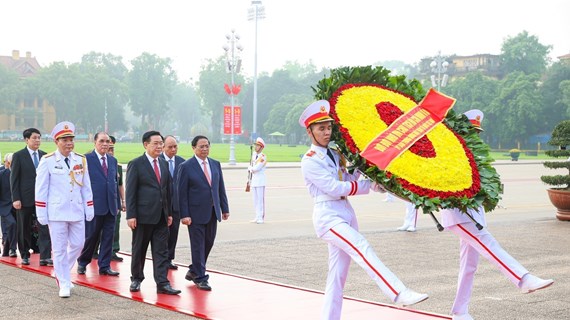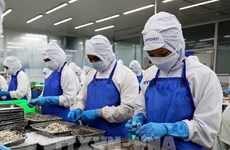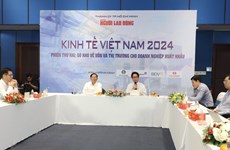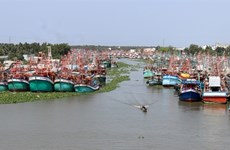Trade officials inch forward
Trade ministers were wrapping up three days of WTO talks on Dec.2 with little
headway seen on ending an eight-year stalemate on framing a trade liberalisation
accord ahead of a 2010 deadline.
Trade ministers were wrapping up three days of WTO talks on Dec.2 with little
headway seen on ending an eight-year stalemate on framing a trade liberalisation
accord ahead of a 2010 deadline.
Parties appeared unwilling to budge on the level of cuts to agriculture subsidies and industrial product tariffs which caused the impasse between developed and emerging nations in the Doha round of global trade talks.
Officials said that no landmark proposals were made to bring the process forward, including from the United States and India , blamed for the failure of the July 2008 talks over a disagreement on subsidy protection for poor Indian farmers.
US Trade Representative Ron Kirk and Indian Commerce Minister Anand Sharma met at least twice at the sidelines of the Geneva meeting, with the US envoy calling on trade-driven developing nations to open up their markets as vital for conclusion of the Doha round.
India , Brazil and others in the Group of 20 developing countries which act as a big negotiating block primarily on agriculture have called for a spring ministerial meeting next year to give a final push to negotiations.
The US has not flatly rejected the idea.
But Kirk said, “There is a little bit of a rush to say we’ve got to have this meeting by this date because we’ve set something, rather than focusing on really putting the time and the attention into the sustained bilateral negotiations that can yield real meaningful market access.
“We’d rather spend our time on that,” Kirk was quoted by French news agency AFP as saying.
The Doha Round began in 2001 with a focus on dismantling obstacles to trade for poor nations by striking an accord that will cut agriculture subsidies and tariffs on industrial goods. Deadlines to conclude the talks have been missed several times.
Discussions have been dogged by disagreements over issues including how much the US and the European Union should reduce aid to their farmers and the extent to which developing countries such as India , China and South Africa should lower tariffs.
“The UK is disappointed that WTO members have not yet been able to take the final steps to agree an outline ( Doha ) deal,” said Gareth Thomas, British Trade Minister.
“If we don’t make progress soon, we will miss our 2010 target and that would be a great loss for the global economy and the world’s poorest,” he said, in a reminder of the target date set by the leaders of the Group of 20 emerging and developed economies.
A successful Doha outcome would boost the global economy by around 170 billion USD annually, some estimates show./.
Parties appeared unwilling to budge on the level of cuts to agriculture subsidies and industrial product tariffs which caused the impasse between developed and emerging nations in the Doha round of global trade talks.
Officials said that no landmark proposals were made to bring the process forward, including from the United States and India , blamed for the failure of the July 2008 talks over a disagreement on subsidy protection for poor Indian farmers.
US Trade Representative Ron Kirk and Indian Commerce Minister Anand Sharma met at least twice at the sidelines of the Geneva meeting, with the US envoy calling on trade-driven developing nations to open up their markets as vital for conclusion of the Doha round.
India , Brazil and others in the Group of 20 developing countries which act as a big negotiating block primarily on agriculture have called for a spring ministerial meeting next year to give a final push to negotiations.
The US has not flatly rejected the idea.
But Kirk said, “There is a little bit of a rush to say we’ve got to have this meeting by this date because we’ve set something, rather than focusing on really putting the time and the attention into the sustained bilateral negotiations that can yield real meaningful market access.
“We’d rather spend our time on that,” Kirk was quoted by French news agency AFP as saying.
The Doha Round began in 2001 with a focus on dismantling obstacles to trade for poor nations by striking an accord that will cut agriculture subsidies and tariffs on industrial goods. Deadlines to conclude the talks have been missed several times.
Discussions have been dogged by disagreements over issues including how much the US and the European Union should reduce aid to their farmers and the extent to which developing countries such as India , China and South Africa should lower tariffs.
“The UK is disappointed that WTO members have not yet been able to take the final steps to agree an outline ( Doha ) deal,” said Gareth Thomas, British Trade Minister.
“If we don’t make progress soon, we will miss our 2010 target and that would be a great loss for the global economy and the world’s poorest,” he said, in a reminder of the target date set by the leaders of the Group of 20 emerging and developed economies.
A successful Doha outcome would boost the global economy by around 170 billion USD annually, some estimates show./.












